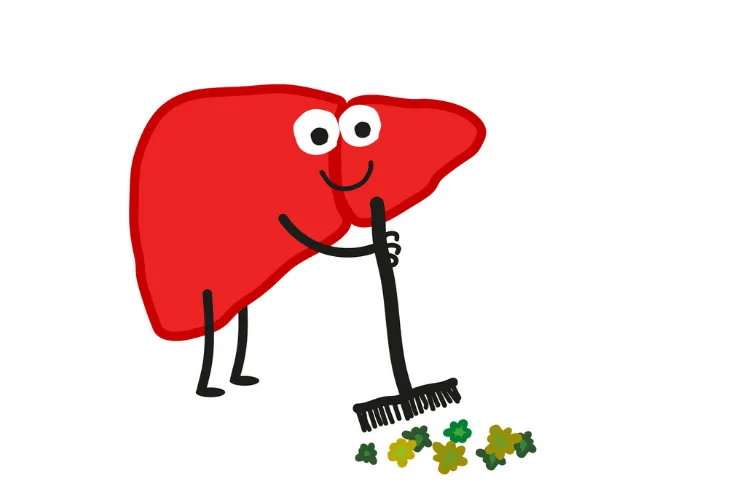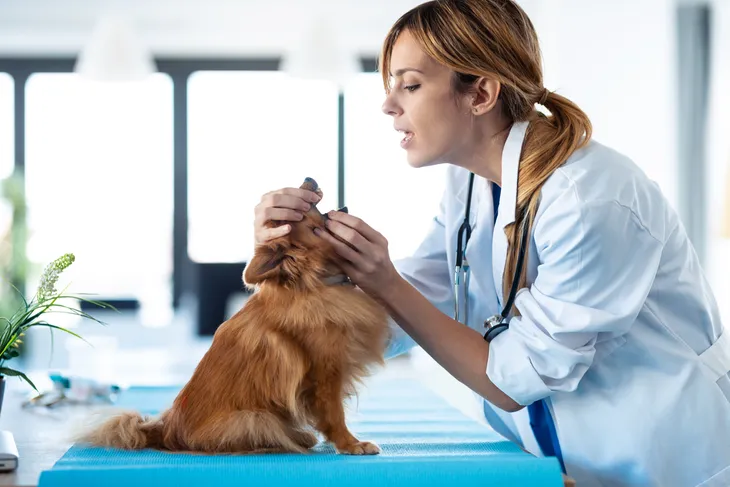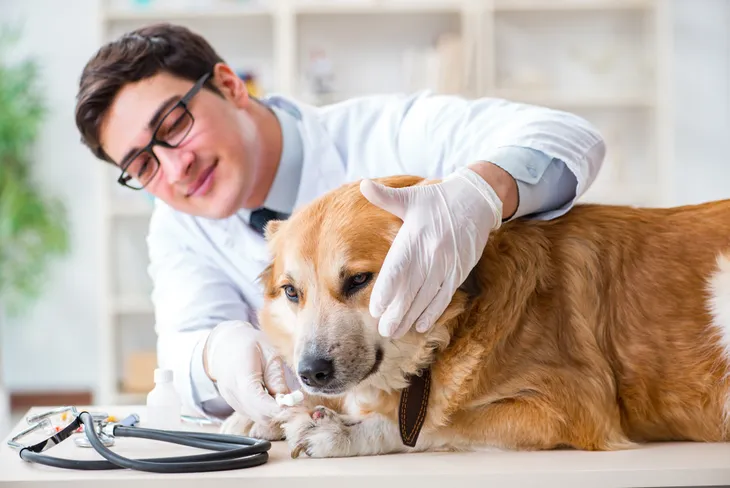- Though the liver may look like a small brown mass, it is a vital and complex organ that serves many important functions for your pup.
- Early-stage liver disease can be hard to detect because symptoms are usually non-specific, meaning they are common to a number of ailments.
- Liver disease can’t always be prevented, however, there are steps you can take to help reduce your dog’s risk.
- Early intervention is key!
The liver is a vital organ for both humans and dogs. It helps with digestion and blood clotting and it’s responsible for removing toxins from the body. When the liver isn’t functioning as it should, it can make your furry companion unwell. Left untreated, it can even be fatal. This is why it’s important to get informed!
Protect your pup by knowing the signs of liver disease and get them veterinary care if they develop. To help you get informed, here’s what you need to know about liver disease in dogs, including the common signs, causes, and treatment options.
The Role of the Liver
Though the liver may look like a small brown mass, it is a vital and complex organ that serves many important functions for your pup. For starters, according to PetMD, the liver helps detoxify your dog’s blood, breaks down toxins, metabolizes and stores essential nutrients, produces enzymes, and eliminates waste from the body.
However, since the liver plays an important role in many bodily functions, “liver disease can manifest as a wide variety of symptoms depending on the vital function affected,” explains the source. This is why it’s important to know the varying signs and symptoms of liver disease and get your dog to the vet if you suspect something is off.
Types of Liver Disease
Liver disease can be categorized into two types: chronic liver disease or acute liver disease. Chronic liver disease develops gradually and can be caused by other ongoing health conditions, such as diabetes or cancer, explains the ASPCA.
Acute liver disease, on the other hand, develops suddenly. It can cause life-threatening symptoms and is a medical emergency. The source says that poisoning is the most common cause of acute liver failure, however, it can also be caused by infection or excess exposure to heat, such as leaving your dog in a hot car.
Early Signs of Liver Disease in Dogs
Knowing the signs of liver disease is the first step in getting your dog the help it needs. The ASPCA says symptoms of early-stage liver disease “are non-specific, which means they are common to a number of ailments and do not directly point to a liver problem.” This is why identifying liver disease early can be difficult.
That said, the source says to be on the lookout for vomiting and diarrhea, as well as increased thirst and frequent trips to go pee. A loss of appetite, weight loss, and changes in behavior (such as lethargy, depression, or irritability) may also be early signs of liver disease.
Advanced Signs of Liver Disease in Dogs
As liver disease advances, new symptoms will begin to develop. One of those symptoms is jaundice and this is a telltale sign of liver disease. Jaundice is a condition that causes the skin, white of the eyes, and gums to turn a yellowish color due to high levels of bilirubin.
Other advanced signs of liver disease include blood in the urine or stool, problems with blood clotting, swelling of the abdomen, blindness, seizures, and coma. The ASPCA says neurological problems are also possible (such as disorientation or lack of coordination) which are caused by an accumulation of toxins.
What Causes Liver Disease in Dogs?
According to Hill’s Pets, liver disease can develop in dogs when “any of their liver’s functions are disrupted.” Some of the most common conditions that lead to liver disease in dogs include infectious hepatitis, toxic hepatopathy, and vacuolar hepatopathy (such as Cushing’s disease, thyroid disease, or diabetes).
The source also notes that portosystemic shunts, liver cancer, inherited liver disease, and idiopathic chronic hepatitis are also common conditions that can lead to liver disease. While there are a lot of causes of liver disease in dogs, the source notes that “most are preventable and all are treatable to some extent.”
Causes of Liver Failure in Dogs
As we know, acute liver disease or liver failure happens suddenly which means it has different causes than chronic liver disease. Hill’s Pets says the main causes of liver failure in dogs are ingestion of toxins, excessive heat, or infections.
For starters, there are many substances that are toxic to dogs such as household chemicals, artificial sweeteners like xylitol, and even foods like onion, avocado, and dark chocolate. Ingesting any toxic substances can cause liver failure so it’s important to know what is toxic to your pup.
Exposure to excessive heat or heatstroke can also cause liver failure so never leave your dog in a hot parked car, and when outside provide ample shade and plenty of fresh, clean drinking water. The source notes, “In all of these cases, early intervention can prevent your dog from having liver failure.”
Are Some Breeds More At Risk Than Others?
While any dog can develop liver disease, some may have an increased risk due to congenital conditions. For example, the ASPCA says breeds like Yorkshire terriers, golden retrievers, labrador retrievers, schnauzers, poodles, and German shepherds are predisposed to copper storage disease.
Copper storage disease causes copper to build up in the liver, causing damage to this vital organ. Additionally, some puppies can be born with liver shunt, “a genetic condition that affects the circulation of blood in the liver,” explains the source. If you’re concerned about your dog’s risk of liver disease, talk to your vet.
Diagnosing Liver Disease in Dogs
Any abnormal symptoms should be reported to your vet. Early intervention typically provides the best outcome. The ASPCA says your vet will require a blood test to diagnose liver disease. The blood test checks the levels of enzymes, proteins, as well as other substances that are produced by the liver.
Your vet will also likely require a urinalysis to assess the overall health of your dog’s liver and kidneys. In some cases, an X-ray or ultrasound may be necessary to check for an enlarged liver, gallstones, cysts, or signs of cancer. A liver biopsy may also be required.
How to Treat Liver Disease in Dogs
Treatment can vary depending on how much injury the liver has endured. Your vet will first need to identify the cause of the disease to determine the best treatment for your furry companion. So what are some of the treatment options?
Veterinarians.org says your vet may administer antibiotics to help treat infections in your dog’s liver. This may also influence what medications your dog can take as well as their dosage. The source also notes your vet may recommend supplements to encourage healing and in some cases, surgery may be necessary.
How to Treat Liver Failure in Dogs
Treating liver failure requires a different approach as time is of the essence! The main goal is to first stabilize your dog’s symptoms. Severely affected dogs will likely need intravenous fluids and electrolytes to decrease blood toxicity.
If your dog has too much fluid in their abdomen (which can cause breathing difficulties), a long needle may be inserted to get rid of some of the fluid. The source also notes diuretics or enemas may also be necessary to clean out their system as is a blood transfusion if their blood isn’t clotting properly. After stabilizing your dog’s symptoms, your vet will then treat the underlying cause.
Dietary Changes
Your vet may recommend dietary changes as a part of treatment and to keep your dog’s liver healthy in the future. A liver-friendly diet typically consists of foods that are “highly digestible and sufficiently calorie-dense,” explains Hill’s Pets.
The source notes you should look for labels like “complete and balanced” when picking out food as this will help ensure your dog is getting ideal levels of sodium, potassium, chloride, as well as other essential minerals. That said, it is important to consult your vet first. Find out which foods they recommend for your dog.
Can Liver Disease Be Prevented?
Liver disease can’t always be prevented, however, there are steps you can take to help reduce your dog’s risk. For starters, PetMD says to make sure your dog is up-to-date on vaccines. Dogs should be vaccinated for infectious canine hepatitis, and some may require a leptospirosis vaccine.
Another great way to prevent acute liver disease is to keep your dog away from toxic substances. Also, be sure to take your dog in for regular exams so your vet can check for early signs of liver disease. Early intervention is key!















